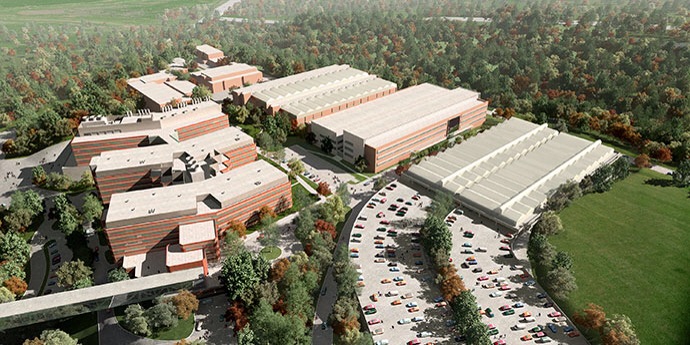
Monsanto is preparing to make Chesterfield a center of the flowering global biotechnology industry, which is forecast to be valued at $453.3 billion by 2017. First the agribusiness giant announced a $400 million expansion at their Chesterfield Village Research Center last year to augment a corporate commitment to sustainable agriculture. Now nextSTL sources are saying the expansion will include a second phase that will dwarf the first in size and push the projected budget over $1 billion.
Phase one will begin following Tarlton’s completion of a $40 million garage currently under construction. The first phase is expected receive more than $31 million in state incentives, and be completed by the end of 2016. It will aid development of Monsanto’s seed and trait pipeline. Greenhouses and plant growth chambers can be programmed to represent any climate around the world offering company scientists an opportunity to observe and select the best performing seeds for in-ground testing.
The first phase will also facilitate consolidation of Monsanto’s research and design team. Additional components of phase one include construction of, 13 controlled environment agriculture rooms, 250 new labs, a $70 million conference center, a $140 million biotechnology building, and 36 greenhouses to be built on top of the new garage. Bids will be sent to subcontractors this summer by project manager Alberici.
Multiple sources are saying the company is actively planning for a $700 million second phase to the Chesterfield campus expansion. Phase two will shift focus to the undeveloped side of the Monsanto campus situated on 210 acres close by the Missouri River bluffs. Contractors are already pursuing, and planning for the expected second phase.
The company has stated it expects to add 675 high paying jobs throughout the area by 2017. The average salary of the new hires will be approximately $85,000. The St. Louis region is already considered a mecca for plant scientists. Aside from Monsanto, the Danforth Center and Washington University are prominent area biotech players. Monsanto has 4,500 area employees including 1,000 working at the 1.5 million sq. ft. Chesterfield facility. Upon completion of the first phase employee capacity at the campus will bloom to 2,000.
Monsanto spent $150 million in 1984 when it first developed the Chesterfield campus. In 2000 the company merged with Pharmacia & Upjohn and changed its name to Pharmacia Corporation. The current company spun off from Pharmacia in 2002. The independent company focused solely on agriculture and leased space at the Chesterfield site from Pharmacia. The lease continued after Pfizer purchased Pharmacia in 2003. In 2009 Pfizer cut 600 area jobs and then sold the campus back to Monsanto for $430 million in 2010. The pharmaceutical giant still occupies space and conducts research at the Monsanto campus.
Sources say there is another possible factor for the enormity of the Chesterfield expansion. Monsanto is seriously contemplating shutting down their Creve Couer campus and making the Chesterfield Village Research Center corporate headquarters. This move would take place in 2020 following completion of the second phase to the billion-dollar Chesterfield project. Both the company commercial and corporate teams are currently housed in Creve Couer. Monsanto moved to the suburban community in 1957 after outgrowing its headquarters in downtown St. Louis.
Monsanto supplies approximately 90% of the world’s GMO seeds. At the official groundbreaking ceremony last October company chairman and CEO Hugh Grant commented, “Our Chesterfield expansion is focused on strengthening our world-class capabilities in the discovery and development of innovations for farmers around the world.” According to the company website, the company is specifically working to double yields in core crops by 2030.
GMO technology is highly controversial and has many detractors. A major 2008 UN /World Bank-sponsored report compiled by 400 scientists and endorsed by 58 countries concluded that genetically modified crops have little to offer to the challenges of poverty, hunger, and climate change. The report recommended organic farming as the sustainable way forward for developing countries. Additionally, the United States is the only developed country in the world that does not have mandatory GMO labeling laws.
nextSTL was first to report on the Monsanto expansion in January of 2013. The company denied the nextSTL item in a Patch article. An official announcement came four months later. An attempt to reach Monsanto for comment regarding phase two was unsuccessful.

